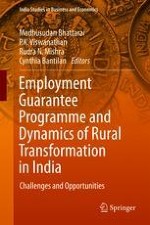2018 | OriginalPaper | Chapter
8. MGNREGS: Political Economy, Local Governance and Asset Creation in South India
Author : Vinoj Abraham
Published in: Employment Guarantee Programme and Dynamics of Rural Transformation in India
Publisher: Springer Singapore
Activate our intelligent search to find suitable subject content or patents.
Select sections of text to find matching patents with Artificial Intelligence. powered by
Select sections of text to find additional relevant content using AI-assisted search. powered by
